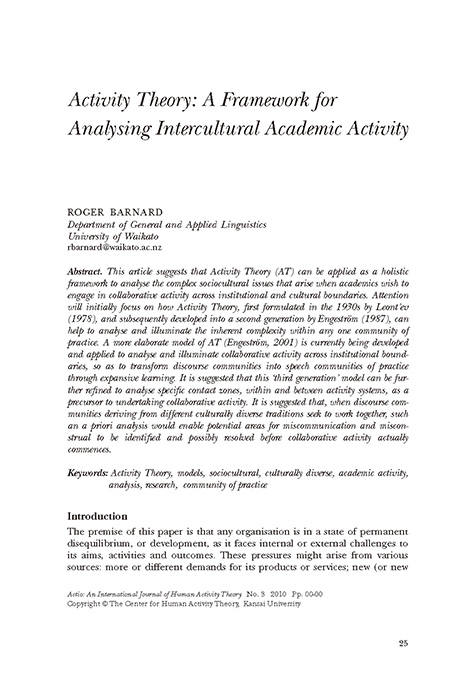
Abstract
Reference

Abstract
This article suggests that Activity Theory (AT) can be applied as a holistic framework to analyse the complex sociocultural issues that arise when academics wish to engage in collaborative activity across institutional and cultural boundaries. Attention will initially focus on how Activity Theory, fi rst formulated in the 1930s by Leont’ev (1978), and subsequently developed into a second generation by Engeström (1987), can help to analyse and illuminate the inherent complexity within any one community of practice. A more elaborate model of AT (Engeström, 2001) is currently being developed and applied to analyse and illuminate collaborative activity across institutional boundaries, so as to transform discourse communities into speech communities of practice through expansive learning. It is suggested that this ‘third generation’ model can be further refi ned to analyse specifi c contact zones, within and between activity systems, as a precursor to undertaking collaborative activity. It is suggested that, when discourse communities deriving from different culturally diverse traditions seek to work together, such an a priori analysis would enable potential areas for miscommunication and misconstrual to be identifi ed and possibly resolved before collaborative activity actually commences.
References
Bassey, M. (1981). Pedagogic research: On the relative merits of the search for generalisation and study of single events. Oxford Review of Education, 7(1), 73-94.
Bazeley, P. (2007). Qualitative data analysis with NVivo. London: Sage.
Bhaba, N. (1994). The location of culture. London: Routledge.
Daniels, H., Brown, S., Edwards, A., Leadbetter, J., Martin, D., Middleton, D., et al (2005). Studying professional learning for inclusion. In K. Yamazumi, Y. Engeström, & H. Daniels (Eds.), New learning challenges: Going beyond the industrial age system of school and work (pp. 79-101). Osaka, Japan: Kansai University Press.
Edwards, A. (2007). Relational agency in professional practice: A CHAT analysis. Actio: An International Journal of Human Activity Theory, 1, 1-18.
Engeström, Y. (1987). Learning by expanding: An activity-theoretical approach to developing research. Helsinki, Finland: Orienta-Konsultit.
Engeström, Y. (2001). Expansive learning at work: Toward an activity-theoretical reconceptualization. Journal of Education and Work, 14(1), 133-156.
Engeström, Y. (2005). Expansive learning as collaborative concept formation at work. In K. Yamazumi, Y. Engeström, & H. Daniels (Eds.), New learning challenges: Going beyond the industrial age system of school and work (pp. 47-77). Osaka, Japan: Kansai University Press
Leont’ev, A.N. (1978). Activity, consciousness, and personality. Englewood Cliffs, NJ: Prentice-Hall.
Leont’ev, A.N. (1981). The problem of activity in psychology. In J. V. Wertsch (Ed.), The concept of activity in Soviet psychology (pp. 37-71). Armonk, NY: M. E. Sharpe.
Lincoln, Y., & Guba, E.G. (1985). Naturalistic inquiry. Beverley Hills, CA: Sage.
Merriam, S. (1998). Qualitative research and case study applications in education (2nd ed.). San Francisco, CA: Jossey-Bass.
Morrison, D.E. (1998). The search for a method: Focus groups and the development of mass communication research. Luton, England: University of Luton Press.
Pea, R.D. (1993). Practices of distributed intelligence and designs for education. In G. Salomon (Ed.), Distributed cognitions: Psychological and educational considerations (pp.47-87). New York, NY: Cambridge University Press.
Swales, J. (1990). Genre analysis: English in academic and research settings. Cambridge, England: Cambridge University Press.
Vygostsky, L.S. (1929). The problem of the cultural development of the child, II. Journal of Genetic Psychology, 36, 414-434.
Wenger, E. (1998). Communities of practice: Learning, meaning and identity. Cambridge, England: Cambridge University Press.
Yamazumi, K. (2007). Human agency and educational research: A new problem in activity theory. Actio: An International Journal of Human Activity Theory, 1, 19-40.